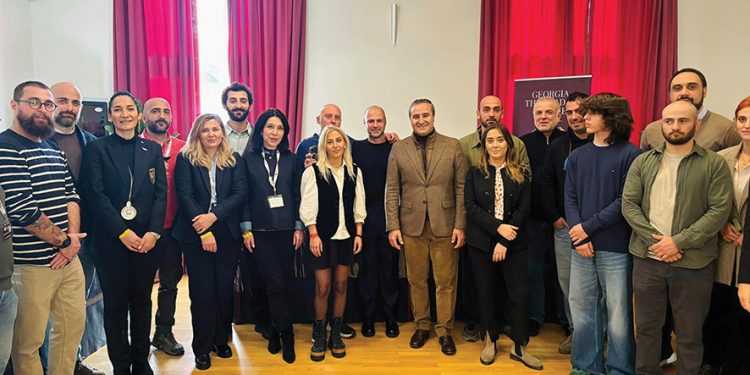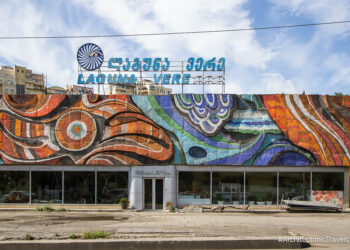Merano Wine Festival 2023 was held on November 4-6 in Merano, Italy. Georgian Wine producers participated in the festival with a variety of wines for guests to try from different wine regions of Georgia: Kakheti, Kartli, Kvemo Kartli, Meskheti, and Racha.
On November 5, at the Terme Hotel, a Georgian wine tasting was held with the theme: Winemaking Regions of Georgia. Wines there were presented with other popular Georgian products – churchkhela, gozinaki, jam, and adjika. The tasting session was attended by various wine experts, wine journalists, buyers and winemakers from Italy, among them Guido Invernizzi, wine expert and professor at the Italian Sommelier Association, and Helmuth Koecher, founder and executive director of the Merano Wine Festival.
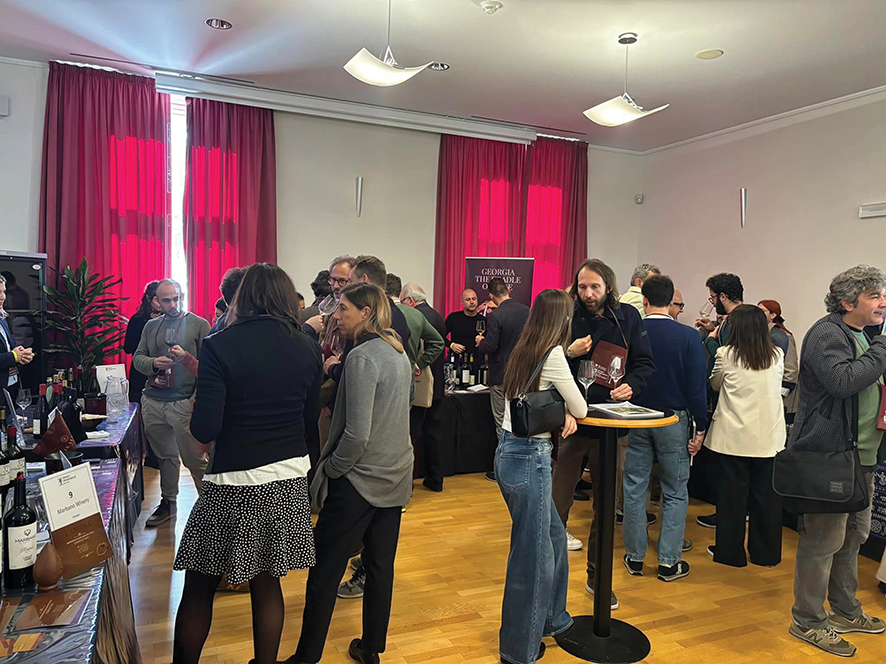
“A very well attended tasting took place in Merano, on the occasion of the Merano Wine Festival, in the elegant halls of the Hotel Terme, this time with a wink eastwards, towards Georgia and its wines in qvevri (amphora),” Marco Sciarrini wrote for vinodabere.it. “Georgian viticulture, and in particular their amphora wine, greatly attracts enthusiasts, wine lovers, and professionals, seeing ancestral winemaking setting a trend. Presenting this event, ‘Back to the Roots,’ was Guido Invernizzi, professor of the Italian Sommelier Association.”
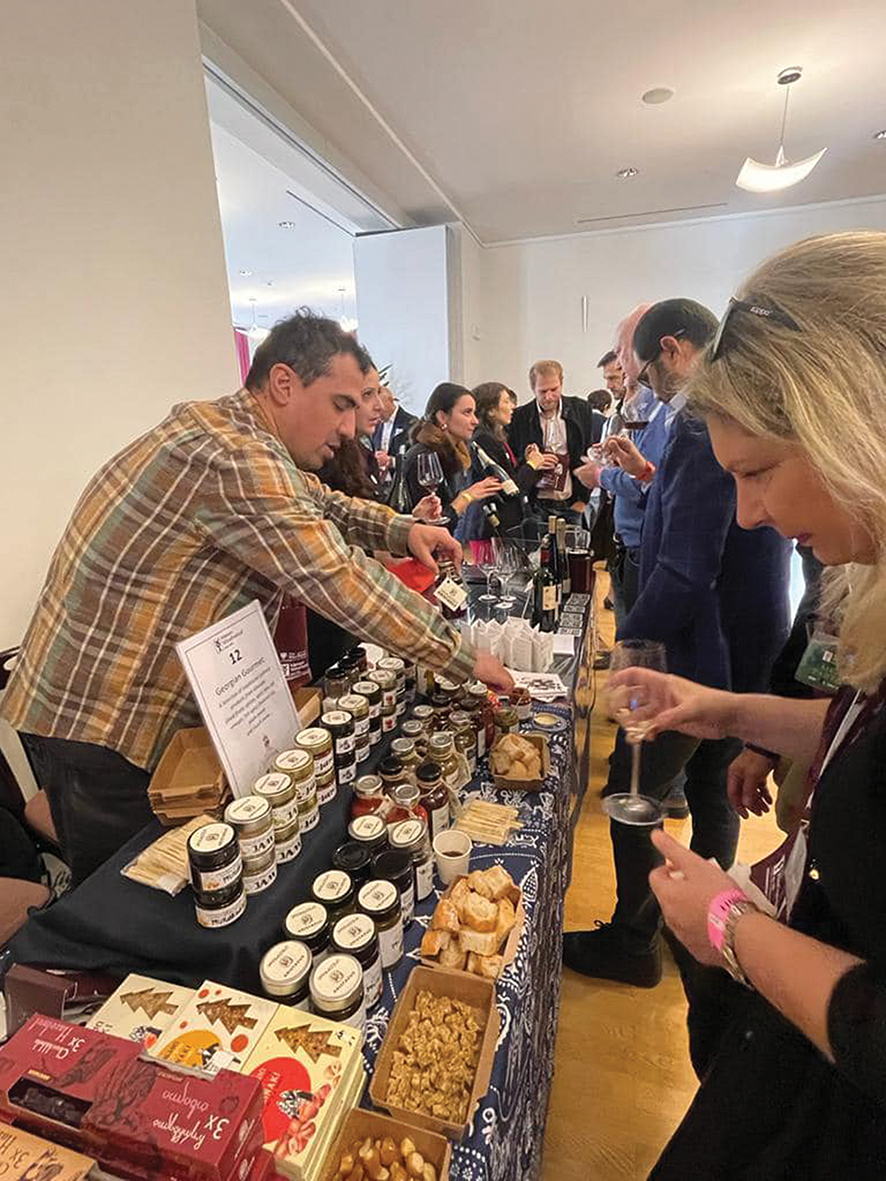
That wine originated in Georgia about 8000 years ago has been supported by recent archaeological discoveries found in the country, allowing it to rightly place itself at the center of wine interest, “after years of anonymity due to the isolation of the Iron Curtain,” Sciarrini informs readers, noting that with the fall of the Soviet Union, the country resumed its native wine culture after decades in which producers had been forced to eradicate many of the native vines present in the area.
Georgian viticulture, and in particular their amphora wine, greatly attracts enthusiasts, wine lovers, and professionals, seeing ancestral winemaking setting a trend
“In fact, in every dictatorship, the world of wine suffers or stops,” Invernizzi told Sciarrini. “Look at South African viticulture, and even after the regimes in Argentina and Chile.”
“There is a lot of talk about wine in amphorae, but not everyone knows that it is marginal compared to the entire production: In fact, only 5% – 7% of wine is produced in amphorae,” Sciarrini writes. “Compared to the past, when the trend was for slightly edgy wines, we have now turned towards products that are improved for our palates, and this has meant that the demand has increased, particularly in Europe.”
In his article, Marco Sciarrini goes on to highlight his favorites among the Georgian selection presented at the Merano Wine Festival 2023.
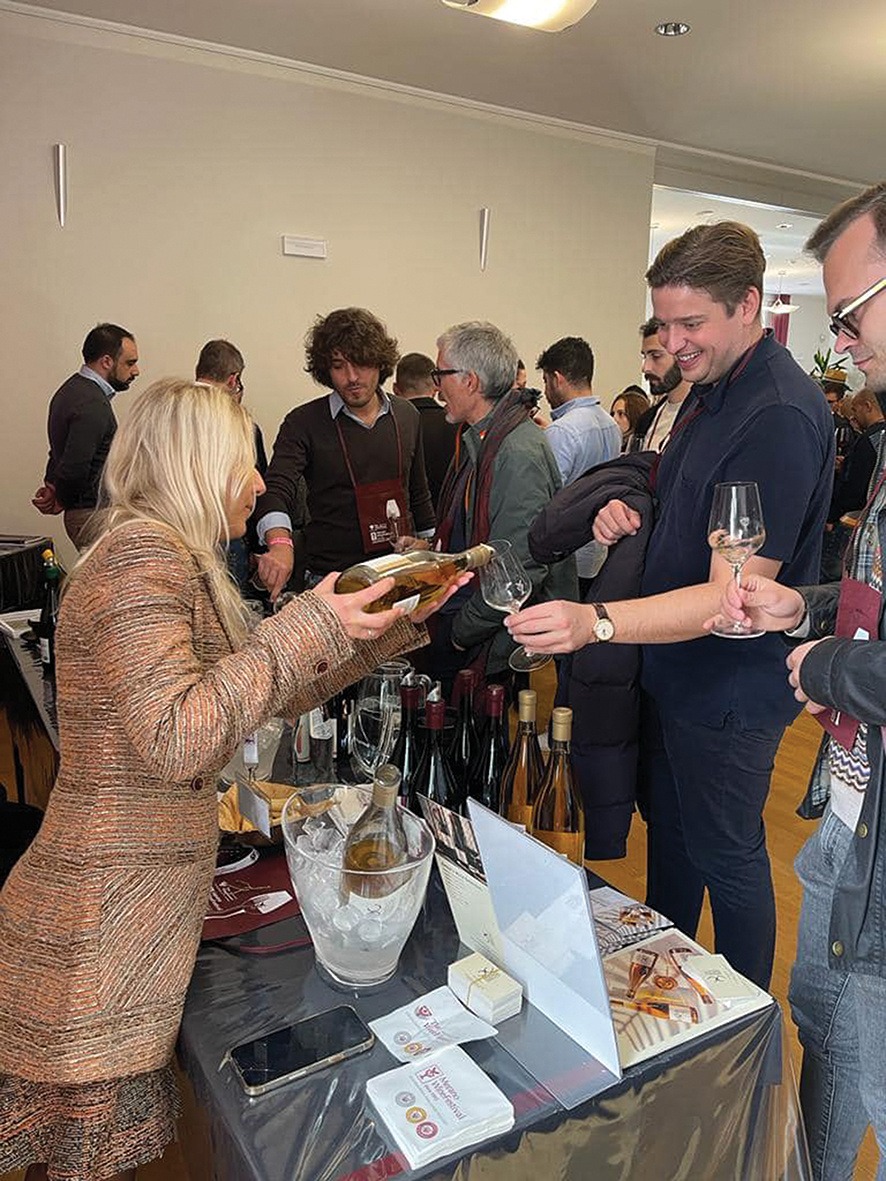
Amoa Khikhvi Qvevri 2021
Amoa is a small family-run winery, founded in 2017 by Anri Chanchibaze and located in the village of Vardisubani in the Kakheti region of eastern Georgia.
“Amoa’s Khikhvi Qvevri 2021, from Khikhvi, a pure grape with thin skin, was produced using the ancient traditional Georgian qvevri winemaking method. It offers a golden yellow color, oxidative notes on the nose, fruity apricot, tropical fruits, honeyed nougat notes, good savory acidity on the palate, and a tannic note with a prolonged finish,” Sciarrini says.
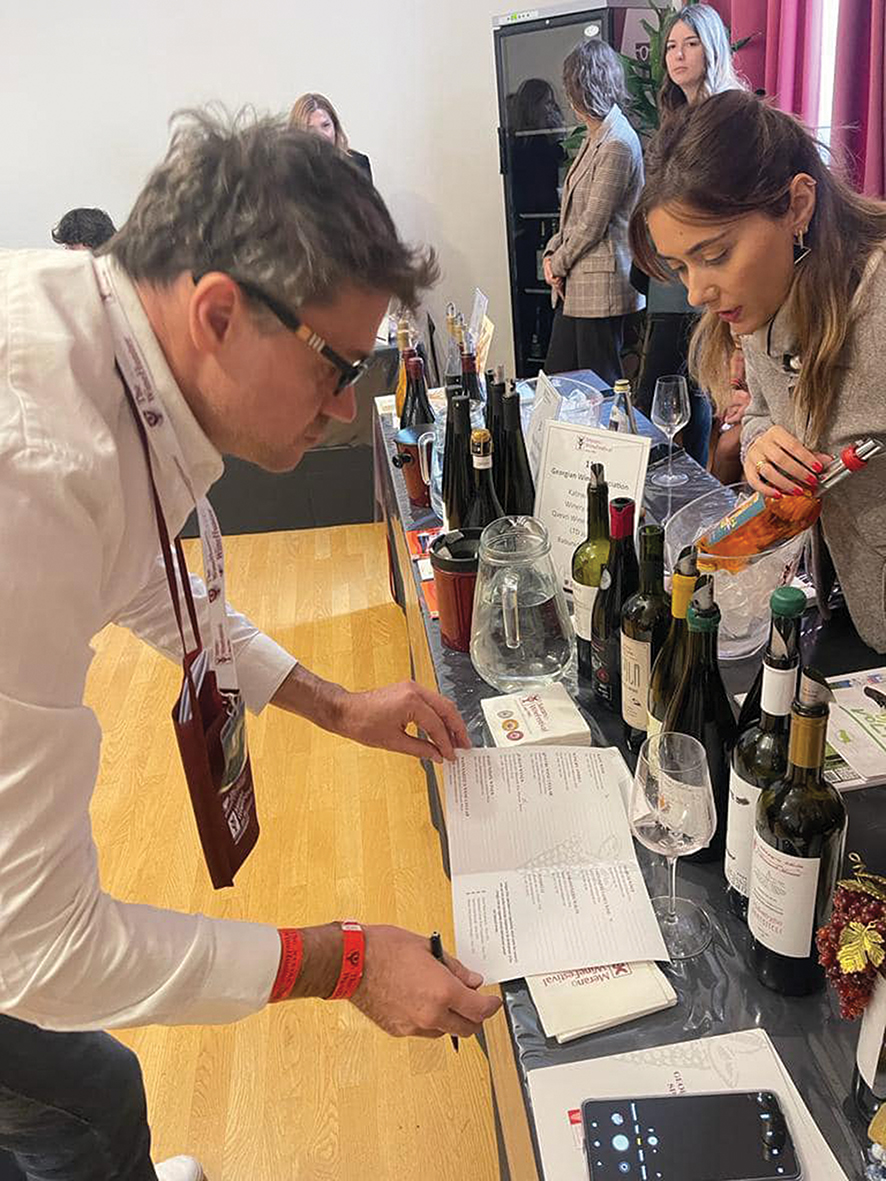
Barbales Marani Krakhuna 2021 – Amber white dry wine Krakhuna
The Barbales winery is located in the Imereti region, in the village of Vartsikhe, and was founded in 2014, named after Barbale, the goddess of fertility and the sun in Georgian mythology. One of the main deities of the pantheon of pre-Christian gods, Barbale conditioned and ensured the fertility and the continuous cycle of life not only of man but also of the earth, and of every living being.
“The grapes come from lands in the Kvirila river valley and present a wine of light straw color, fruity notes of banana, apricot and intensely ripe citrus fruits; tropical hints, with honeyed tones of stone fruit, chestnut, nougat, a light herbaceous nuance, and sensations of wax and enamel on the palate,” Sciarrini writes. “A full body and taste that is round and persistent, and pleasant to drink.”
Nino Meris Kisi 2022 dry wine Qvevri Kisi
This winery is located in the Kakheti/Kvareli region, on soils made up of volcanic rock and black earth.
The wine is kept in qvevri for six months with 30% of skin maceration.
“A golden yellow color, boasting an iodine note of seaweed on the nose, fruity notes of apricot and candied fruit, honey, ripe quince, apple, white plum, lemon, white flowers, and lilac. It leaves an iodine freshness on the palate, and a great taste-olfactory correspondence that has a long finish,” Sciarrini tells us.
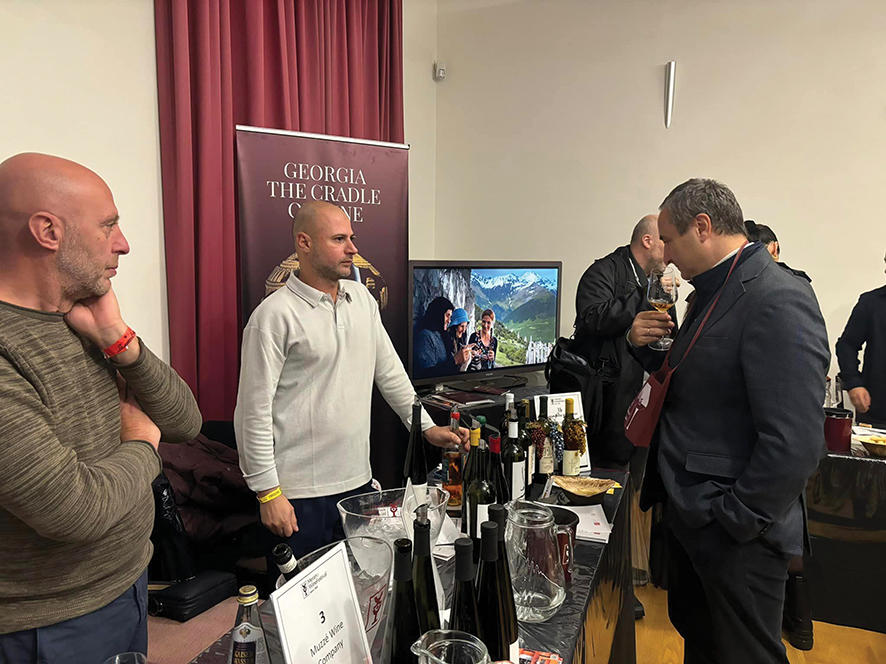
Chateau Mukhrani Chinebuli 2021
Chateau Mukhrani is a historic company brought back to life in 2022 when a group of businessmen laid the foundations for the restoration of the Château Mukhrani project, bringing it back to its former glory and resuming production by combining modern and traditional technologies. The Chateau Mukhrani castle is located in the beautiful village of Mukhrani, 35 minutes’ drive from the capital Tbilisi, and in the Kartli region between the Caucasus and Trialeti mountain ranges in the basin of the Ksani and Araqvi rivers. The soils there are sandy-clayey on the surface, with large river gravels and granular limestone in the subsoil. Chateau Mukhrani’s 102 hectares of vineyards are organic and certified. The company is led by Patrick Honnef CEO & Technical Director, with a past in France in Saint-Émilion.
The Georgian wine tasting session was attended by numerous wine experts, wine journalists, buyers and winemakers from Italy
“Chateau Mukhrani’s Chinebuli 2021 is of a golden yellow color, being slightly amber, fruity on the nose with white pulp fruit, white peach, quince, a very slight floral hint and honeyed sensations,” Sciarrini says. “On the palate, it’s a great balance, fresh-savory. The fruity olfactory sensations return with a pleasant bitter aftertaste and prolonged finish.”
Marbano Winery Asuretuli 2019 Qvevri Red
Marbano Winery can be found in the Kvemo Kartli region, near Bolnisi, with vines growing on 40 hectares. Levan Bandzeladze founded Marbano (an acronym of the full name of his daughter Mariam Bandzeladze) in 2018, building the qvevri cellar in keeping with the tradition of his village.
“The Asuretuli 2019 Qvevri Red is purple in color, offering a fresh fruity nose with cherry, blackberry, currant, blueberry, raspberry and currant, gooseberry, and floral sensations. It is fresh on the palate, with important structure accompanied by lively acidity, with fruity olfactory notes which remain persistent in the finish,” the Italian notes.
Natenadze’s Wine Cellar Meskhuri Amber 2021
Natenadze presented an unfiltered qvevri wine made with Meskhuri sapere grapes, Meskhuri kharistvala, and Tskhenis dzudzu tetra. The Tskhenis dzudzu tetra, a vine that is more than 400 years old, grows in the region of Meskheti – a dry, continental, volcanic, highland region, predominant with basalt stones and limestone soil.
The Meskhuri Amber 2021 was fermented and refined in qvevri for 6 months in contact with the skins, then in a steel still.
“Meskhuri Amber 2021 presents with a pale, ruby red color. It has a salty marine note on the nose with sensations of anchovies, anchovy sauce and light spiciness, fruity notes with fresh red fruits, wild cherries, and balsamic sensations of dried, wild herbs,” Sciarrini says. “It is fresh, savory, and juicy on the palate, balanced with a tannic texture.”
Ikalto Family Cellar, Saperavi, Red Dry Wine 2019
The Chkheidze winery produces wine using the ancient qvevri winemaking technology. The company respects organic and ecological standards during the entire production cycle, and stores its wine in an internal cellar at a specially controlled temperature. The family winery grows its vines on three hectares, of which 40% is Saperavi and 60% Rkatsiteli.
“Their Saperavi, Red Dry Wine 2019 boasts a red color tending towards garnet, and on the nose offers fruity notes of cherry, blackcurrant, plum, pear and black cherry, apples, Morello cherries and spicy vanilla, cinnamon and sweet spices. It is juicy on the palate, with a balance between the acid and tannic. The finish highlights a mineral side,” the wine writer tells us.
Winery Ambra Aleksandrouli-Mujuretuli 2022 Qvevri
This small, family run winery creates wine obtained from Aleksandrouli and Mujuretuli vines grown in Racha, the village of Bugeuli in the Khvanchkara microzone, on the left bank of the Rioni river. Local legends say that this wine was Stalin’s favorite.
The vineyard is located at an altitude of 300-600 meters above sea level and is 102 years old. Grapes there are cultivated and harvested exclusively by hand on two hectares, divided into terroirs.
“The Aleksandrouli-Mujuretuli 2022 Qvevri had one-month contact with the skin in qvevri. It has a ruby-purple color and is intense on the nose, with fruity notes of cherry and raspberry, wild strawberries, floral hints of rose and rose petals, with balsamic nuances. Intensely fresh on the palate, it is very pleasant to drink, with the tannin well balanced by a dynamic acidity, and a sweet note to finish,” Marco Sciarrini concludes.
By Katie Ruth Davies

